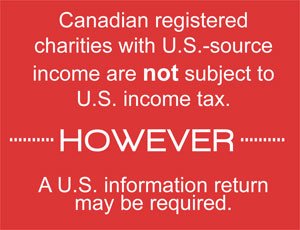Cross-Border Charitable Activities

The Canada-U.S. treaty provides significant relief for cross-border charitable activities. The treaty, and the competent authority agreement that implements it, says that a religious, scientific, educational, or charitable organization organized under the laws of either country and recognized therein as exempt is automatically recognized as exempt in the other country; it is not necessary to make an application to the other country. To qualify, a U.S. organization must be recognized by the IRS as exempt under Code section 501(c)(3), and a Canadian organization must be recognized by the CRA as a registered charity.
As a result of the treaty provisions, U.S. section 501(c)(3) charities with Canadian-source income are not subject to Canadian income tax, and Canadian registered charities with U.S.-source income are not subject to U.S. income tax. However, even though no tax is due, a U.S. information return may be required, depending on whether the Canadian charity is recognized as a U.S. public charity or a U.S. private foundation and depending on the total gross receipts that the Canadian charity receives from U.S. sources. The IRS assumes that a Canadian registered charity is the equivalent of a U.S. private foundation unless it applies to the IRS to be recognized as a public charity.
A Canadian charity that is recognized as a U.S. public charity may need to file form 990 (“Return of Organization Exempt from Tax”) unless:
- The charity normally does not receive more than $50,000 in gross receipts from sources within the United States (including amounts received from donors), and
- It has no significant activity (excluding investment activity) in the United States. However, if an organization that qualifies for this exemption has U.S.-source income, it must submit annually a simplified form 990-N e-postcard.
 The benchmark is generally U.S. $50,000, but it rises to US $75,000 if the organization has existed for one year or less: in that case, the organization must file form 990 unless its gross receipts from sources within the United States were no more than US $75,000 during its first taxable year. If the organization has existed for more than one year but less than three years, it does not have to file a form 990 if its average annual gross receipts for its first two taxable years were no more than US $60,000. An organization that has existed for three years or more need not file a form 990 if its average annual gross receipts for the immediately preceding taxable years, including the year for which the return is filed, were no more than U.S. $50,000.
The benchmark is generally U.S. $50,000, but it rises to US $75,000 if the organization has existed for one year or less: in that case, the organization must file form 990 unless its gross receipts from sources within the United States were no more than US $75,000 during its first taxable year. If the organization has existed for more than one year but less than three years, it does not have to file a form 990 if its average annual gross receipts for its first two taxable years were no more than US $60,000. An organization that has existed for three years or more need not file a form 990 if its average annual gross receipts for the immediately preceding taxable years, including the year for which the return is filed, were no more than U.S. $50,000.
The reporting requirements for a Canadian registered charity that is deemed to be a U.S. private foundation are less clear. At the least, the requirement to file the applicable information return, form 990-PF (“Return of Private Foundation”), is waived if the Canadian organization receives less than U.S. $25,000 of U.S.-source income. It appears that the US $50,000 threshold that applies to a public charity does not apply to a Canadian organization deemed to be a private foundation.
The treaty provides for the tax-exempt treatment of an organization and for the cross-border deductibility of contributions to that organization. The treaty allows a deduction to a U.S. citizen or a U.S. resident who contributes to a Canadian registered charity, subject to the same limitations that apply to a contribution to a U.S. charity, if the taxpayer has Canadian-source income against which to claim the deduction. In the absence of treaty relief, a U.S. taxpayer cannot claim a charitable deduction for a contribution to a foreign charity unless the foreign charity has applied for and received tax-exempt status in the United States.
 Under U.S. law, a gift of cash to a U.S. charity is fully deductible against a taxpayer’s income, subject to a 50 percent adjusted gross income limitation for gifts to public charities and a 30 percent limitation for gifts to private foundations. A gift of publicly traded stock (provided that the stock is long-term capital gain property) to a public charity is subject to a 30 percent adjusted gross income limitation and to a 20 percent limitation for such a gift to a private foundation.
Under U.S. law, a gift of cash to a U.S. charity is fully deductible against a taxpayer’s income, subject to a 50 percent adjusted gross income limitation for gifts to public charities and a 30 percent limitation for gifts to private foundations. A gift of publicly traded stock (provided that the stock is long-term capital gain property) to a public charity is subject to a 30 percent adjusted gross income limitation and to a 20 percent limitation for such a gift to a private foundation.
The deduction for a U.S. citizen or a U.S. resident who contributes to a Canadian registered charity may only offset the individual’s Canadian-source income. To determine the allowable deduction, the taxpayer must multiply his or her adjusted gross income from Canadian sources by the applicable percentage limitation set out above. Excess deductions may be carried over for up to five years. However, the Canadian income-source limitation does not apply if the Canadian charity is a college or university where the citizen or the resident, or a family member, is or was enrolled.
In addition, the income-source limitation does not apply to US “friends of ” charities, which are U.S. domestic charitable organizations formed to raise funds for particular Canadian charities. For the many taxpayers who do not have Canadian-source income, but who do have an affinity for a certain Canadian charity, giving to a “friends of ” organization is the only way to indirectly donate to a Canadian charity and also to receive a U.S. charitable income tax deduction. Many Canadian charities with a large potential U.S. donor pool have established a U.S. “friends of ” organization for this purpose.
Written by attorney Catherine Eberl.
Originally published in Canadian Tax Highlights, Volume 23, Number 11, November 2015. Reprinted with permission.
Legal Notice: Opinions in this blog post do not reflect the opinion or endorsement of Charity Exchange or its affiliates. The opinions in this post should not be used as legal or financial advice for any financial decision. The advice or opinions shared in this blog post are solely those of the author and are not the opinion of Charity Exchange or its affiliates. For legal or financial advice, always consult with your financial advisor or legal council.

